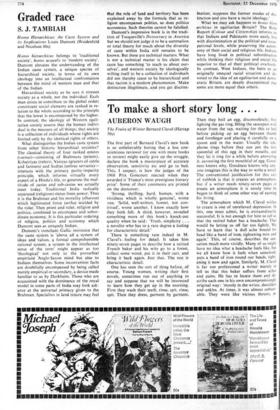Graded race
S. J. TAMBIAH
Homo Hierarchicus: the Caste System and its Implications Louis Dumont (Weidenfeld and Nicolson 80s) Homo hierarchicus belongs to 'traditional society', homo aequalis to 'modern society'. Dumont elevates the understanding of the Indian caste system, a unique species of hierarchical society, in terms of its own ideology into an intellectual confrontation between the mind of western man and that of the Indian.
Hierarchical society as he sees it stresses society as a whole, not the individual. Each man exists to contribute to the global order, constituent social elements are ranked in re- lation to the whole according to the principle that the lower is encompassed by the higher. In contrast, the ideology of Western egali- tarian society asserts that the human indivi- dual is the measure of all things; that society is a collection of individuals whose rights are limited only by the identical rights of others.
What distinguishes the Indian caste system from other historic hierarchical societies? The classical theory of four ranked estates (varnas)—consisting of Brahmans (priests), Kshatriyas (rulers), Vaisyas (grazers of cattle and farmers) and Sudras (unfree servants)— interacts with the primary purity-impurity principle, which informs virtually every aspect of a Hindu's life, to generate the mul- titude of castes and sub-castes we actually meet today. Traditional India radically separated (religious) status from power. Thus it is the Brahman and his morality (dharma) which legitimated force (artha) wielded by the ruler. Then priest and ruler, religion and politics, combined to encompass and subor- dinate economy. It is this particular ordering of religion, politics and economy which Dumont sees as uniquely Indian.
Dumont's trenchant Gallic insistence that the caste system is 'above all a system of ideas and values, a formal comprehensible rational system, a system in the intellectual sense of the term' might appear as too 'theological' not only to the proverbial empiricist Anglo-Saxon mind but also to Indians themselves. Some inconvenient facts are doubtfully encompassed by being called merely empirical or secondary, a device made familiar to us by Durkheim. Those who are acquainted with the dominance of the royal model in some parts of India may look ask- ance at the universal primacy given to the Brahman. Specialists in land tenure may feel that the role of land and territory has been explained away by the formula that as re- ligion encompasses politics, so does politics economics. Such theories cannot be falsified.
Dumont's impressive book is in the tradi- tion of Tocqueville's Democracy in America but we should not judge it to be a summation or total theory for much about the diversity of caste within India still remains to be known. But these are technical matters. What is not a technical matter is his claim that caste has something 'to teach us about our- selves', and western society by ideologically willing itself to be a collection of individuals did not thereby cease to be hierarchical and that racism is a modern phenomenon. 'Make distinction illegitimate, and you get discrim- ination; suppress the former modes of dis- tinction and you have a racist ideology.'
What we may ask happens to homo hier. archicus in egalitarian Britain? The Rose Report (Colour and Citizenship) informs us that Indians and Pakistanis more easily live with discrimination at the political and occu- pational levels, while preserving the auton- omy of their social and religious life. Indians have long lived in political subordination while thinking their religious and social life superior to that of their political overlords, In contrast, West Indians, the heirs to an originally unequal racial situation and de- voted to the idea of an egalitarian and demo- cratic Britain, are deeply disappointed that some are more equal than others.










































 Previous page
Previous page